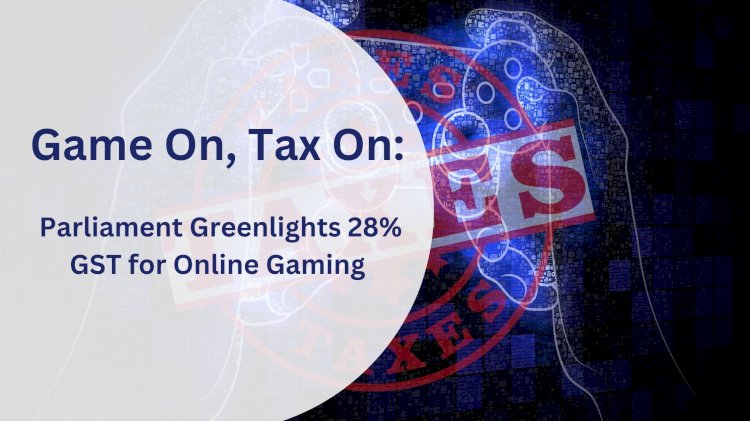Game On, Tax On: Parliament Greenlights 28% GST for Online Gaming
The Indian Parliament's landmark decision to introduce a 28% Goods and Services Tax (GST) on online gaming marks a significant step in adapting taxation policies to the digital age. As the virtual realm becomes a thriving cultural and economic domain, proponents argue that taxing online gaming levels the playing field with other forms of entertainment and ensures equitable revenue generation. However, concerns arise regarding potential adverse effects on the gaming community, particularly younger participants, as the high GST rate might deter engagement. Industry experts emphasize the need for a balanced approach that fosters growth while addressing these challenges. This pivotal moment underscores the delicate balance between innovation and regulation, as stakeholders collaborate to shape a sustainable future for the dynamic landscape of online gaming in the country.
By Shreya Rajvanshi Gangal

In a watershed moment that signals a new era for the digital landscape, the Indian Parliament has made a decisive move by approving a 28% Goods and Services Tax (GST) on online gaming. This momentous decision has sent ripples across both the gaming industry and the wider public, igniting discussions about the implications, challenges, and opportunities that lie ahead. As the virtual realm intersects with the realms of taxation and regulation, it's time to delve deeper into the ramifications of this pivotal development.
Unpacking the Decision
The advent of technology has catalyzed a transformation in the way we entertain ourselves, with online gaming emerging as a cultural phenomenon that transcends borders. As this form of digital leisure becomes increasingly intertwined with our daily lives, governments worldwide are grappling with how to harness its economic potential and ensure a level playing field in terms of taxation. The Indian Parliament's nod to a 28% GST on online gaming reflects a proactive stance in adapting to the evolving digital ecosystem.
Proponents of this taxation policy argue that it's a logical step in the modernization of taxation structures. Just as traditional forms of entertainment and commerce are subject to taxes, the digital arena should not be an exception. This move aligns with the government's commitment to fostering equitable taxation and expanding revenue streams in a digital age. The substantial revenues generated from this tax could potentially bolster essential sectors such as education, healthcare, and infrastructure.
However, the decision has not been without its critics. Concerns have been raised about the potential repercussions on the gaming community, particularly the younger generation who form a significant portion of online gamers. The 28% GST rate might inadvertently deter casual gamers and new enthusiasts from participating, impacting the vibrancy of the industry. Moreover, the dynamic and rapidly evolving nature of online gaming presents unique enforcement challenges that need to be carefully addressed.
Looking Ahead: Balancing Innovation and Regulation
While the debate around the 28% GST on online gaming rages on, it's important to acknowledge that this landmark decision marks the beginning of a transformative journey. Industry experts emphasize the need for a balanced approach that supports both economic growth and the gaming community's vitality. Rather than a one-size-fits-all taxation strategy, there's an opportunity to explore nuanced alternatives that consider the diverse landscape of online gaming.
Collaboration between government bodies, industry stakeholders, and the gaming community itself will be paramount as the implications of this taxation policy unfold. Open dialogue and ongoing assessments can pave the way for refinements that strike the delicate equilibrium between innovation and regulation. The ultimate goal is to cultivate an environment where online gaming thrives, contributing its share to national progress while preserving its accessibility and appeal.
Conclusion
The Indian Parliament's approval of a 28% GST on online gaming signifies a pivotal moment in the evolution of the digital realm. As the virtual world converges with the legislative arena, the path forward is brimming with possibilities and challenges. Striking the right balance between taxation, innovation, and community engagement will shape the future of online gaming in the country. The road ahead demands thoughtful consideration, adaptability, and a commitment to nurturing both economic growth and the dynamic spirit of the gaming culture.
What's Your Reaction?



















